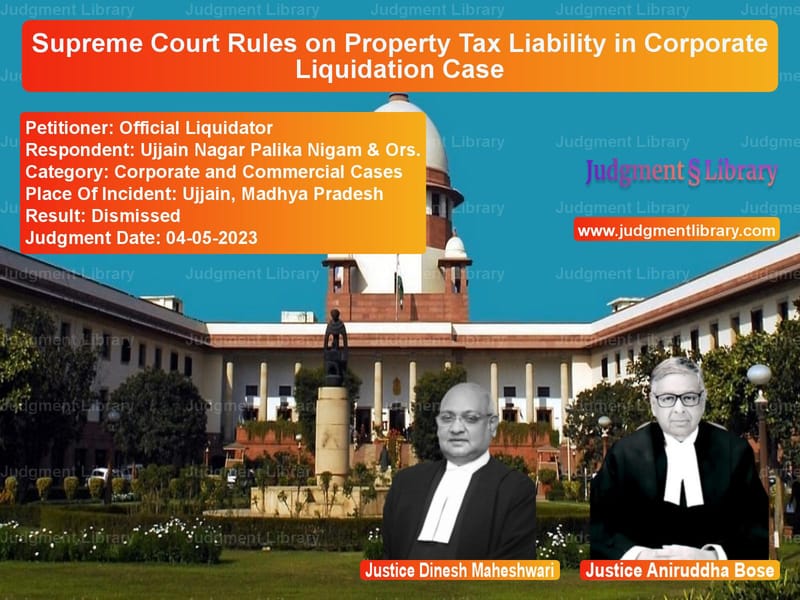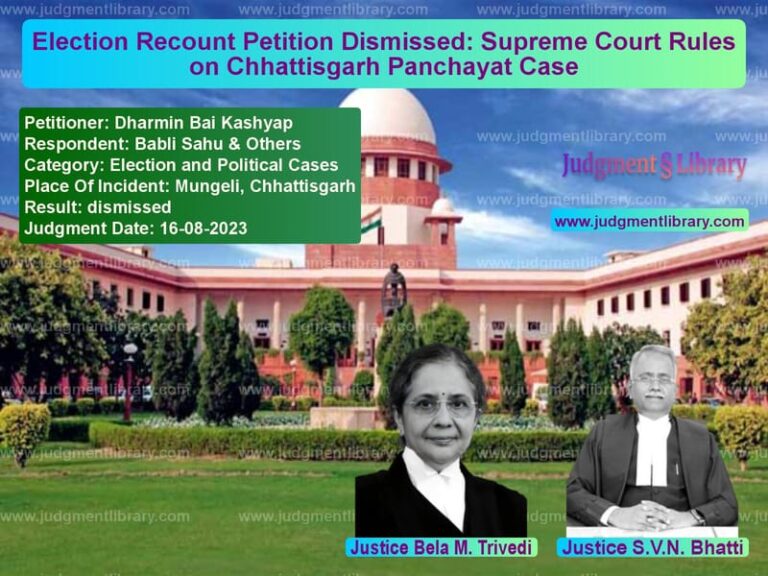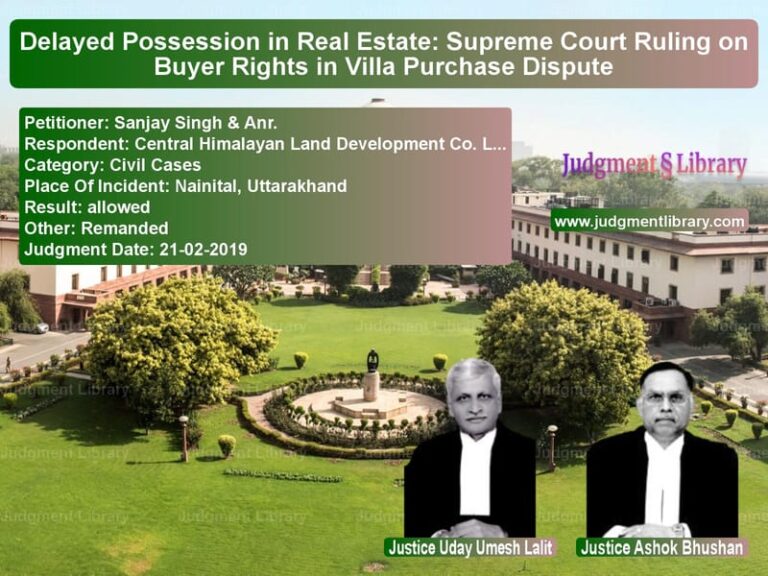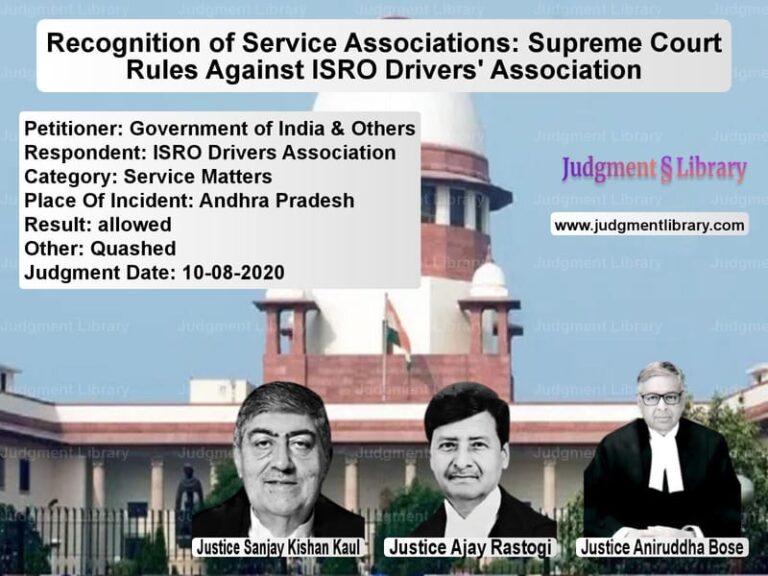Supreme Court Rules on Property Tax Liability in Corporate Liquidation Case
The case of Official Liquidator v. Ujjain Nagar Palika Nigam & Ors. revolves around the liability of property tax and water tax on a company undergoing liquidation. The Supreme Court was called upon to decide whether the Official Liquidator (OL) of IISCO Ujjain Pipe and Foundry Company Limited was liable to pay municipal taxes after the winding-up order and until the confirmation of the sale of assets to the auction purchaser.
This judgment is significant as it clarifies the responsibilities of an Official Liquidator in settling post-liquidation liabilities and the obligations of an auction purchaser regarding pre-sale municipal tax dues.
Background of the Case
The company, IISCO Ujjain Pipe and Foundry Company Limited, became financially unviable and was referred to the Board for Industrial and Financial Reconstruction (BIFR). The BIFR recommended its winding up, which was ordered by the Company Court on July 10, 1997. The Official Liquidator was appointed to take possession of the company’s assets.
Key facts of the case:
- The assets of the company were put up for sale through a notice dated May 9, 2003.
- The sale was conducted on an ‘as is where is whatever there is’ basis, meaning that bidders had to satisfy themselves about the property’s condition.
- The property was sold for Rs. 20.50 crore, and the sale was confirmed on July 4, 2003.
- Post-sale, Ujjain Nagar Palika Nigam (Municipal Corporation) claimed property tax and water tax dues from the Official Liquidator for the period from 1997 to 2003.
- The Official Liquidator rejected the claims for the period after July 10, 1997, stating that the company was under liquidation.
- The Company Court ruled that municipal tax liabilities were part of the winding-up costs and had to be settled before distribution of sale proceeds.
- The High Court upheld the ruling, stating that the tax liability fell on the Official Liquidator.
Petitioner’s Arguments
The appellant, Official Liquidator, represented by Senior Advocate Arjun Bisht, contended:
- Once a company is under liquidation, all financial obligations should be settled based on the Companies Act, prioritizing workmen’s dues and secured creditors.
- Municipal taxes arising post-liquidation were not the Official Liquidator’s responsibility.
- The terms of sale clearly stated that the property was sold on an ‘as is where is’ basis, meaning all liabilities transferred to the purchaser.
- Sections 529A and 530 of the Companies Act do not obligate the Official Liquidator to settle post-liquidation taxes before secured creditors.
Respondent’s Arguments
The respondent, Ujjain Nagar Palika Nigam, represented by Senior Advocate S.V. Raju, countered:
- Municipal tax is a statutory charge under Section 185 of the Madhya Pradesh Municipal Corporation Act, 1956, making it the first charge on the property.
- Since the Official Liquidator had possession of the property until sale confirmation, municipal taxes were part of the liquidation costs.
- The Companies Act does not exempt a company under liquidation from paying property taxes.
- Failure to pay taxes would unfairly shift the burden onto the municipal corporation.
Supreme Court Judgment
The case was heard by Justice Dinesh Maheshwari and Justice Aniruddha Bose. The Supreme Court upheld the High Court’s ruling, holding that the Official Liquidator was responsible for municipal taxes accrued post-liquidation until the sale was confirmed.
Read also: https://judgmentlibrary.com/supreme-court-quashes-high-court-order-in-sarfaesi-auction-dispute/
1. Municipal Taxes Are a Statutory Charge
The Court ruled that municipal taxes are a statutory charge on the property and must be cleared before distributing sale proceeds:
“The liability to pay property tax and water tax does not automatically end with a company’s liquidation order. These dues must be settled as part of the winding-up process.”
2. Sale Notice Did Not Transfer Liabilities
The Court analyzed the sale notice and found it lacked a clause informing the purchaser of existing municipal tax liabilities:
“If the intention was to transfer all liabilities to the purchaser, the Official Liquidator should have explicitly stated so in the sale notice.”
3. Official Liquidator Must Settle Dues Before Distribution
The Court ruled that taxes must be treated as winding-up expenses and paid before distributing funds to creditors:
“Post-liquidation liabilities are to be treated as part of the costs of winding up and must be cleared before any creditor payments.”
4. Section 185 of the M.P. Municipal Corporation Act Applies
The Court held that Section 185 of the Madhya Pradesh Municipal Corporation Act made taxes a first charge on the property:
“Property taxes are not mere debts but statutory dues that must be settled before ownership transfer.”
Final Verdict
The Supreme Court ruled:
- The appeal was dismissed.
- The Official Liquidator must pay property tax and water tax dues from the sale proceeds.
- The auction purchaser is not liable for municipal taxes accrued before July 4, 2003.
- Future sale notices must clearly state whether tax liabilities will be transferred to the purchaser.
Conclusion
This judgment reinforces the principle that statutory municipal dues cannot be ignored in liquidation cases. It ensures that local bodies receive their rightful dues before a company’s assets are distributed among creditors.
Petitioner Name: Official Liquidator.Respondent Name: Ujjain Nagar Palika Nigam & Ors..Judgment By: Justice Dinesh Maheshwari, Justice Aniruddha Bose.Place Of Incident: Ujjain, Madhya Pradesh.Judgment Date: 04-05-2023.
Don’t miss out on the full details! Download the complete judgment in PDF format below and gain valuable insights instantly!
Download Judgment: official-liquidator-vs-ujjain-nagar-palika-supreme-court-of-india-judgment-dated-04-05-2023.pdf
Directly Download Judgment: Directly download this Judgment
See all petitions in Bankruptcy and Insolvency
See all petitions in Company Law
See all petitions in Corporate Compliance
See all petitions in Judgment by Dinesh Maheshwari
See all petitions in Judgment by Aniruddha Bose
See all petitions in dismissed
See all petitions in supreme court of India judgments May 2023
See all petitions in 2023 judgments
See all posts in Corporate and Commercial Cases Category
See all allowed petitions in Corporate and Commercial Cases Category
See all Dismissed petitions in Corporate and Commercial Cases Category
See all partially allowed petitions in Corporate and Commercial Cases Category







